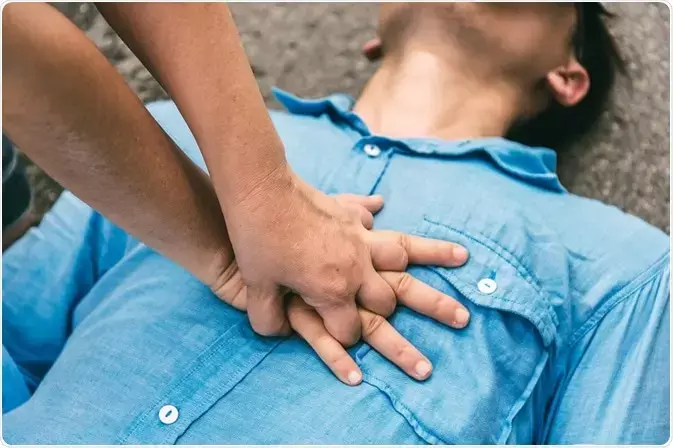- Home
- Medical news & Guidelines
- Anesthesiology
- Cardiology and CTVS
- Critical Care
- Dentistry
- Dermatology
- Diabetes and Endocrinology
- ENT
- Gastroenterology
- Medicine
- Nephrology
- Neurology
- Obstretics-Gynaecology
- Oncology
- Ophthalmology
- Orthopaedics
- Pediatrics-Neonatology
- Psychiatry
- Pulmonology
- Radiology
- Surgery
- Urology
- Laboratory Medicine
- Diet
- Nursing
- Paramedical
- Physiotherapy
- Health news
- Fact Check
- Bone Health Fact Check
- Brain Health Fact Check
- Cancer Related Fact Check
- Child Care Fact Check
- Dental and oral health fact check
- Diabetes and metabolic health fact check
- Diet and Nutrition Fact Check
- Eye and ENT Care Fact Check
- Fitness fact check
- Gut health fact check
- Heart health fact check
- Kidney health fact check
- Medical education fact check
- Men's health fact check
- Respiratory fact check
- Skin and hair care fact check
- Vaccine and Immunization fact check
- Women's health fact check
- AYUSH
- State News
- Andaman and Nicobar Islands
- Andhra Pradesh
- Arunachal Pradesh
- Assam
- Bihar
- Chandigarh
- Chattisgarh
- Dadra and Nagar Haveli
- Daman and Diu
- Delhi
- Goa
- Gujarat
- Haryana
- Himachal Pradesh
- Jammu & Kashmir
- Jharkhand
- Karnataka
- Kerala
- Ladakh
- Lakshadweep
- Madhya Pradesh
- Maharashtra
- Manipur
- Meghalaya
- Mizoram
- Nagaland
- Odisha
- Puducherry
- Punjab
- Rajasthan
- Sikkim
- Tamil Nadu
- Telangana
- Tripura
- Uttar Pradesh
- Uttrakhand
- West Bengal
- Medical Education
- Industry
Updated CPR guidance in accordance with new variants of Covid-19 amid evolving pandemic: AHA

USA: The American Heart Association's (AHA) recent update on cardiopulmonary resuscitation (CPR) for patients with suspected or confirmed COVID-19 now requires health care personnel to put on complete personal protective equipment (PPE) before initiating CPR on any patient with confirmed or suspected COVID-19. This is a significant departure from the last edition of this guideline, which stated that physicians should not postpone chest compressions to put on PPE or cover these patients' faces.
The alteration was made in response to the advent of the Omicron version of the SARS-CoV-2 virus, which is more highly infectious. In the event that first responders won't be wearing adequate PPE, they should do so quickly and commence CPR on a patient who is having cardiac arrest due to COVID-19, whether proven or suspected.
The US Centers for Disease Control and Prevention [CDC] and the World Health Organization [WHO] both recently made recommendations, which are reflected in this revised guideline. In view of the substantial decline in cardiac arrest survival rates amidst the COVID-19 pandemic, the updated recommendation gives additional insight into PPE usage during probable aerosol-generating procedures (AGPs) and underscores the necessity for resuscitation best practices.
The following are the highlights of the 2022 Interim Guidance on CPR in Patients With Confirmed or Suspected COVID-19:
1. When performing AGPs such as defibrillation, bag-mask ventilation, chest compressions, positive-pressure ventilation, intubation, or in a setting where such procedures are routinely performed, all healthcare providers should wear a respirator along with other PPE ( gloves, gown, and eye protection).
2. Quick CPR, including chest compressions as soon as it is safe to do so, is critical for cardiac arrest survival. Patients with COVID-19, whether confirmed or suspected, should get the greatest resuscitative care available.
3. Regardless of the possibility of experiencing resuscitation situations, all healthcare personnel should take adequate measures and have reached PPE in all clinical settings. The proper use of personal protective equipment (PPE) is essential for the safety of healthcare workers doing resuscitations.
In conclusion, according to the American Heart Association, healthcare organizations should continue to secure appropriate PPE as it becomes available, ensure training regarding appropriate application and use of PPE, reinforce effective PPE use, and generate systems so that health care providers have quick access to proper PPE when emergency care is required.
Reference:
2022 Interim Guidance to Healthcare Providers for Basic and Advanced Cardiac Life Support in Adults, Children, and Neonates with Suspected or Confirmed COVID-19. News release. American Heart Association: January 24, 2022. Accessed January 31, 2022.
Medical Dialogues consists of a team of passionate medical/scientific writers, led by doctors and healthcare researchers. Our team efforts to bring you updated and timely news about the important happenings of the medical and healthcare sector. Our editorial team can be reached at editorial@medicaldialogues.in.
Dr Kamal Kant Kohli-MBBS, DTCD- a chest specialist with more than 30 years of practice and a flair for writing clinical articles, Dr Kamal Kant Kohli joined Medical Dialogues as a Chief Editor of Medical News. Besides writing articles, as an editor, he proofreads and verifies all the medical content published on Medical Dialogues including those coming from journals, studies,medical conferences,guidelines etc. Email: drkohli@medicaldialogues.in. Contact no. 011-43720751


